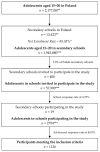Body Mass and Emotional Eating: Emotional Eater Questionnaire (EEQ) in the Polish Adolescents' COVID-19 Experience (PLACE-19) Study
- PMID: 35215480
- PMCID: PMC8879815
- DOI: 10.3390/nu14040828
Body Mass and Emotional Eating: Emotional Eater Questionnaire (EEQ) in the Polish Adolescents' COVID-19 Experience (PLACE-19) Study
Abstract
Stress caused by the Coronavirus Disease 2019 (COVID-19) pandemic may lead to emotional eating which may have a negative impact on the weight status. This study aimed to analyze the association between emotional eating and body mass, as well as changes in body mass during the COVID-19 pandemic, within the Polish Adolescents' COVID-19 Experience (PLACE-19) Study. A total of 1126 Polish adolescents, aged 15-20, were included. A random quota sampling was performed within a national sample, and emotional eating was assessed using Emotional Eater Questionnaire (EEQ). Based on the declared height and weight before and during the pandemic, the respondents were categorized according to their body mass (malnourished, normal weight, overweight, obese) and changes in body mass during the COVID-19 pandemic (lost weight, no body mass change, gained weight). Higher EEQ scores were achieved by female respondents compared with males (p < 0.0001), respondents who stated that they gained weight during the pandemic compared with those who stated either weight loss or no body mass change (p < 0.0001), and overweight and obese respondents compared with those who had normal weight and who were malnourished (p < 0.0001). A higher share of emotional eaters and very emotional eaters was found among female respondents, respondents stating weight gain during the pandemic, and overweight and obese respondents, compared with the other ones (p < 0.0001). Based on the findings, it may be concluded that among Polish adolescents gender, body mass, and body mass change during the COVID-19 pandemic are the major determinants of emotional eating behaviors and that female individuals, obese individuals, and those gaining weight are especially vulnerable to emotional eating behaviors. The results of the study suggest that the issue of emotional eating should be addressed in general public health policy and appropriate education should be provided to vulnerable groups such as female and obese adolescents.
Keywords: Emotional Eater Questionnaire (EEQ); PLACE-19 Study; adolescents; body mass; body mass changes; emotional eater; emotional eating; national study; population-based study.
Conflict of interest statement
The authors declare no conflict of interest.
Figures
Similar articles
-
Analysis of Self-Regulation of Eating Behaviors within Polish Adolescents' COVID-19 Experience (PLACE-19) Study.Nutrients. 2022 Apr 18;14(8):1679. doi: 10.3390/nu14081679. Nutrients. 2022. PMID: 35458243 Free PMC article.
-
Stress during the COVID-19 Pandemic and Emotional Eating Scale Adapted for Children and Adolescents (EES-C) Results in Girls: Polish Adolescents' COVID-19 Experience (PLACE-19) Study.Nutrients. 2023 Sep 28;15(19):4197. doi: 10.3390/nu15194197. Nutrients. 2023. PMID: 37836481 Free PMC article.
-
Emotional Overeating during the COVID-19 Pandemic: Polish Adolescents' COVID-19 Experience (PLACE-19) Study.Nutrients. 2023 Aug 31;15(17):3818. doi: 10.3390/nu15173818. Nutrients. 2023. PMID: 37686850 Free PMC article.
-
Sex-related differences in eating behaviors during COVID-19 pandemic: A systematic review with metanalysis.Appetite. 2024 Dec 1;203:107727. doi: 10.1016/j.appet.2024.107727. Epub 2024 Oct 22. Appetite. 2024. PMID: 39447648
-
COVID-19 Self-quarantine and Weight Gain Risk Factors in Adults.Curr Obes Rep. 2021 Sep;10(3):423-433. doi: 10.1007/s13679-021-00449-7. Epub 2021 Jul 12. Curr Obes Rep. 2021. PMID: 34251647 Free PMC article. Review.
Cited by
-
Mindful Eating Questionnaire: Validation and Reliability in Romanian Adults.Int J Environ Res Public Health. 2022 Aug 24;19(17):10517. doi: 10.3390/ijerph191710517. Int J Environ Res Public Health. 2022. PMID: 36078231 Free PMC article.
-
Food Neophobia, Familiarity with French Cuisine, Body Mass, and Restaurant Food Choices in a Sample of Polish Women.Nutrients. 2022 Apr 3;14(7):1502. doi: 10.3390/nu14071502. Nutrients. 2022. PMID: 35406115 Free PMC article.
-
Analysis of Self-Regulation of Eating Behaviors within Polish Adolescents' COVID-19 Experience (PLACE-19) Study.Nutrients. 2022 Apr 18;14(8):1679. doi: 10.3390/nu14081679. Nutrients. 2022. PMID: 35458243 Free PMC article.
-
The Association of Emotional Eating with Overweight/Obesity, Depression, Anxiety/Stress, and Dietary Patterns: A Review of the Current Clinical Evidence.Nutrients. 2023 Feb 26;15(5):1173. doi: 10.3390/nu15051173. Nutrients. 2023. PMID: 36904172 Free PMC article. Review.
-
Changes in Body Mass Index during the COVID-19 Pandemic among Indonesian Adolescents: The Role of Sex, Urban Area, Baseline BMI, and Appetitive Traits.Obes Facts. 2025;18(2):169-177. doi: 10.1159/000543078. Epub 2024 Dec 11. Obes Facts. 2025. PMID: 39662071 Free PMC article.
References
-
- Frayn M., Knäuper B. Emotional Eating and Weight in Adults: A Review. Curr. Psychol. 2017;37:924–933. doi: 10.1007/s12144-017-9577-9. - DOI
MeSH terms
LinkOut - more resources
Full Text Sources
Medical


